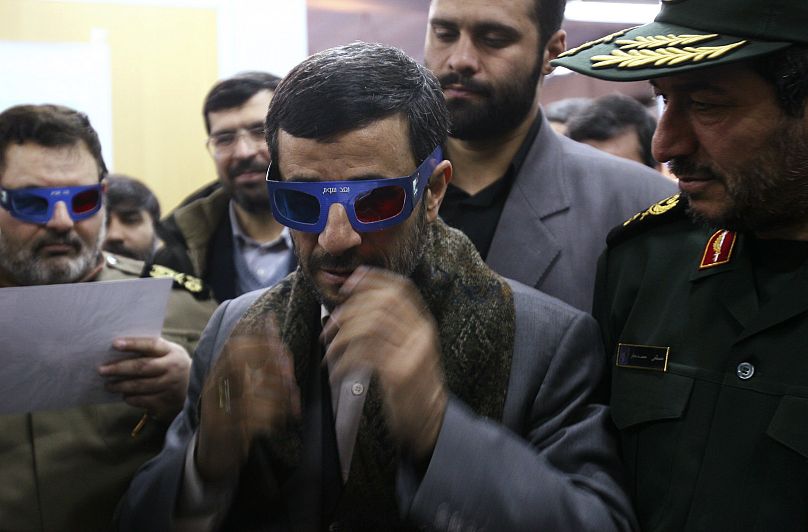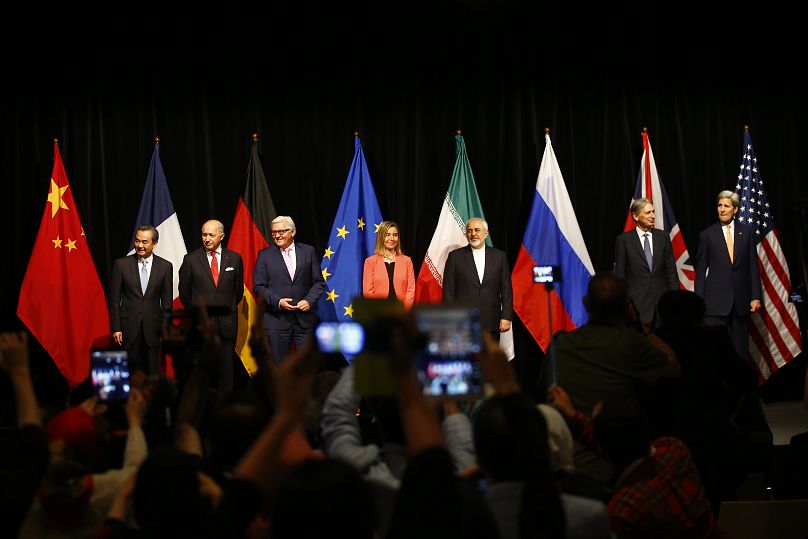in 2015 Iran agreed to restrictions on its nuclear activities in return for the lifting of sanctions - here's what you need to know in 4 questions.
US President Donald Trump will announce on Tuesday whether he will pull the US out of the Iran nuclear deal, or stay in and work with European allies who have tried to persuade him that the accord has successfully halted Tehran's nuclear ambitions.
Why does the world fear an Iran with nuclear weapons?
The decades following the Islamic Revolution in 1979 saw Iran accused of flagrant human rights violations at home and aggressive behaviour abroad, including the use of state-sponsored terrorism. Tehran’s critics highlighted a fundamentalist religious dictatorship bent on extending its influence beyond its borders.
Several countries have nuclear weapons but Iran’s case has long caused shudders, not least among its arch-enemy Israel and Saudi Arabia. Israel neither confirms nor denies whether it has an atomic arsenal, but it is not a signatory to the Nuclear Non-Proliferation Treaty (NPT), unlike Iran. Tehran was found to have breached the treaty by concealing a uranium enrichment programme for many years. Several UN resolutions called on Tehran to stop.
Iran’s insistence that its programme was peaceful weren’t believed in the West. A US intelligence report said Iran had a nuclear weapons programme until 2003. The nuclear watchdog the International Atomic Energy Agency (IAEA) accused the Iranians of lacking transparency. Bellicose rhetoric about Israel from former President Ahmadinejad fuelled the distrust.
Ten years of sanctions imposed on Iran by the UN, US, EU and other countries were partially lifted after the election of President Hassan Rouhani, and a period of US engagement under Donald Trump’s predecessor, Barack Obama. Tehran agreed to suspend parts of its programme under an interim deal in 2013. The deal now in place was struck two years later between Iran and six world powers: the five permanent members of the UN Security Council, plus Germany.
Iran continues to be seen by its adversaries – notably the US, Israel, and Gulf states – as a threat to stability, particularly because of its ballistic missile programme and behaviour across the Middle East, especially its involvement in the wars in Syria and Yemen.
What does Iran say about the deal?
Under the 2015 agreement, known as the Joint Comprehensive Plan of Action (JCPOA), Iran agreed to limit significantly its nuclear activities. The accord committed Tehran to reduce its stockpile of enriched uranium for 15 years, and cut by two-thirds the number of centrifuges installed to enrich uranium for 10 years.
Iran has always argued that its nuclear programme is peaceful and that it has respected the deal’s terms. Despite some technical violations, the IAEA has certified that “Iran has fully complied with its commitments”.
The government in Tehran has said it will not renegotiate the nuclear agreement and has threatened to retaliate if the United States pulls out, without giving details. However, President Rouhani suggested on Monday that Iran might remain in the deal even if Trump abandons it and imposes sanctions.
Tehran has tried to turn the tables on Washington, accusing it of flouting the deal’s terms and of being the unreliable partner. Iran’s Vice-President Eshaq Jahangiri said on Tuesday that it was ready for any scenario. “If the United States violates the deal, it would be naïve to negotiate with this country again.”
What is Donald Trump’s case against the deal?
The US president has consistently attacked the 2015 accord as “insane”, “terrible”, a “disaster”, and the “worst deal in the world”. He has threatened not to continue waiving sanctions against Iran, for which the next deadline is May 12.
Trump argues that the accord only limits Iran’s nuclear activities for a fixed period and fails to address the development of ballistic missiles. He has also claimed that the easing of sanctions had granted Iran a multi-billion dollar “slush fund for weapons, terror and oppression”.
Iran’s missile programme has been closely watched in US military circles. The Pentagon reported to the Senate Armed Services Committee that the country had successfully deployed a long-range anti-aircraft system that marked a “generational improvement” in its capability.
Much of Trump’s fire has been directed at his predecessor. Earlier this year he accused Barack Obama of having “curried favour” with Iran to try to push through the “disastrously flawed” deal. Some of his critics believe the current president’s hostility to the pact is motivated to a large extent by a determination to destroy Obama’s legacy.
Donald Trump has allies in his opposition to the deal, notably Israel and Saudi Arabia, who say it has failed to curb Iran’s aggressiveness or ambitions. However, some experts dispute the president’s claims that the accord leaves Iran free to develop nuclear weapons in the future.
What may happen if the deal collapses?
Iran hasn’t expanded on its threat to retaliate if the US pulls out, but diplomats and military experts say Tehran could seek to resume its nuclear weapons programme or step up its military involvement in Iraq, Syria, Yemen and Lebanon.
A resumption of US sanctions against Tehran has raised questions as to whether other nations in Europe and Asia might be deterred from developing business ties with Iran. Much may depend on whether the US seeks to penalise countries and firms who continue to trade, as well as re-imposing its own measures.
European officials, some of whom have been pessimistic over whether the diplomatic drive to keep the US onside can sway Donald Trump, have been studying mechanisms to protect European firms.
Trade has risen significantly between Iran and Europe since most sanctions were lifted. Iran’s economy, however, has continued to struggle – a significant headache for President Rouhani who promised improvements at the time of his re-election last year.
It’s thought the demise of the nuclear accord could weaken his position further in the face of hardliners among Iran’s leadership who have never been in favour of it.













